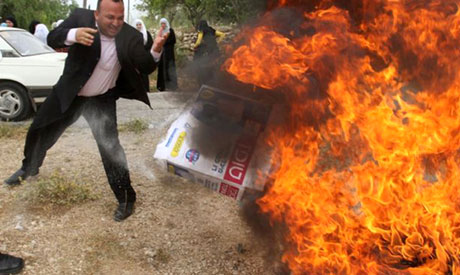
A Palestinian man throw a product from Jewish settlements in a fire in the West Bank village of Salfit in 2010, (Photo: AP).
A notice issued by South Africa's trade ministry on Saturday announced that Israel would henceforth be obliged to label any products it makes on Palestinian land as "Made in Occupied Palestinian Territories."
The statement by the South African Department of Trade and Industry declared that the ministry would "require traders in South Africa not to incorrectly label products that originate from Occupied Palestinian Territory (OPT) as products of Israel."
The labelling issue was stoked further when a Danish newspaper reported Sunday that the same restrictions would be applied in Denmark, albeit optionally, where products made in the West Bank may be declared so or not.
The step "clearly shows consumers that the products are produced under conditions that not only the Danish government, but also European governments, do not approve of. It will then be up to consumers whether they choose to buy the products or not," Israeli daily the Jerusalem Post quoted Danish Foreign Minister Villy Sovndal as saying.
Danish supermarkets will have the option of choosing whether to use the labels or not. The rationale behind the Danish move, according to Sovndal, is that it allows consumers to differentiate between products made in Israel and those produced in "illegal settlements," the Jerusalem Post reported. The move is intended to support the notion of a "two-state solution," Sovndal said.
Likewise, South African Trade Minster Rob Davies said last week that the move was intended to help "South Africans who... support the Palestinians to identify those products."
Both states, however, insisted the moves were not meant to support a boycott of Israeli goods – only those produced in territories occupied after 1967, when Israeli troops invaded and occupied additional land in Palestine, Egypt and Syria.
AFP quoted South Africa's director for trade policies and legislation Macdonald Netshitenzhe as saying that, "For now, there is no decision. But people should know that South Africa recognises Israel inside the 1948 UN borders."
The moves outraged Israeli officials. South Africa's envoy to Israel is expected to be summoned soon for an explanation.
The South African decision "is not a political objection to settlements, rather [it is] the act of singling out a state by a special marking system based on national-political criteria. Therefore, it is by essence a racist move," AFP cited Israel's foreign ministry spokesman Yigal Palmor as saying.
He added: "It is shocking to think that South Africa, of all countries, would display such callousness, and is blindly marching down the slippery slope of racism."
In April, a major British consumer cooperative took the decision to extend its already established boycott of all products Israel produces in the West Bank. The Co-operative Group, the UK's largest mutual business and its fifth largest food retailer, decided to sever trade with any supplier sourcing from Israeli settlements.
Co-op also stressed, however, that it was not boycotting commerce with Israel itself.
UK daily the Guardian reported that Co-op "stresses this is not an Israeli boycott, and that its contracts will go to other companies inside Israel that can guarantee they don't export from illegal settlements."
Shortly after Co-op's decision, a debate at the UK's United Methodist Church (UMC) General Conference saw divestment from Israeli companies operating in the West Bank as a main source of contention.
The UMC fell short of reaching a decision to boycott companies Caterpillar, Hewlett-Packard and Motorola Solutions, "because they provide products used by the Israeli military in the occupation of Palestinian lands."
Despite the General Conference's vote against divestment, the Boycott, Divestment and Sanctions (BDS) movement praised the call for boycott by movements within the UMC, saying that it would "pave the way for further action by the church to hold Israel accountable for its colonial and apartheid regime."
Short link: